|
|
|
|
|
|||
|
In 1996
after the infamous “April 6 Crisis” in Monrovia, Liberia, Dr. Francis N. Kateh had the opportunity to visit Ganta
United Methodist Hospital. There, he would take up assignment after completing
a medical internship. On his way to Ganta, Dr. Kateh saw the massive destruction
that was perpetrated on the people of Liberia, economically, psychologically and physically.
Between Monrovia and Ganta, there were approximately 150 “security gates” manned by various warring factions,
most especially the National Patriotic Front of Liberia, Dr. Kateh recalled. What
amazed him during the trip to Ganta, was a gate approximately three miles out of Gbarnga, Bong County called “SBU-Gate”-
Small Boys Unit Gate. At this gate, he counted over a dozen kids ranging in age
from 8-11 years. Their commander, about 10 years, told Dr. Kateh to identify
himself. Dr. Kateh said to him, “I am Dr. Francis Nah Kateh, and I am traveling
to Ganta United Methodist Hospital”. The young boy asked for Kateh’s
ID card in a loud and intimidating voice. Dr. Kateh took the card and handed
it over to him. The young boy, unable to read, held the card upside down and
began to ask Dr. Kateh some ridiculous questions. His eyes were pitched red;
he had on torn shoes, and carried a pistol and an AK-47 rifle. He became very
irritable and commanded his special assistant to take Dr. Kateh for more interrogation.
Dr. Kateh was afraid because he had escaped death six months prior, 29th of April 2006, on the premises
of the John F. Kennedy Memorial Medical Center where he was told by a warring faction’s fighter that he, the fighter,
needed the “engine” or heart of Dr. Kateh while on his way to check on a patient who received stray bullets in
the abdomen that afternoon and was operated on. Both Dr. Kateh and the fighter fought over the knife and later a fellow fighter
came to the rescue of Dr. Kateh. In spite of his internal fright that he could
be killed by this child soldier, the thought appeared to him, “What will be the future of these kids? Will there ever be any hope for them?” While pondering
these questions, the commander shouted at his assistant to let Dr. Kateh go. When Dr. Kateh arrived at Ganta Hospital, he
saw first hand the destruction of the facility- patients lying on the floor, no medications and the odor from the wards unbearable. “Is there hope?” Dr. Kateh asked himself quietly. After
the completion of his internship, Dr. Kateh took up an assignment at Ganta United Methodist Hospital in 1997. Dr. Kateh made a passionate trip to the United States in May of 1997 to appeal for help. In response, the
Illinois Great Rivers Conference, North Carolina Conference, Minnesota Conference and Indiana Conference of the United Methodist
Church, the much needed funds for renovation, supplies, equipment and other essential services were provided. Dr. Kateh saw the multiplicity of NGOs in various parts of Liberia, yet the services to the people were
very meager. The question that he had pondered at the SBU-Gate began to haunt
him. “Is there hope for Liberians? Is there hope for Africa?”
|
During
their discussion, Prof. Gellatly said, “Dr. Kateh you need to start a Non-for Profit Organization, and I will assist
you with the process”. He was shocked.
What! Start a Non for Profit Organization? She said, “I have seen
the compassion in you and you have everything it takes to make a difference.”
After few hours of reflections, Dr. Kateh decided to call Dr. Stephen Kennedy who and Dr. Kateh shared many characteristics
and the passion in helping to make a difference. He told Dr. Kennedy who is an
HIV/AIDS researcher that they need to start a Non-for-Profit Organization. Dr.
Kennedy asked “How?” Dr. Kateh responded that his professor would
help them through the process. Kennedy replied, “That’s fantastic!”
with a resiliency. The paperwork began at the end of 2003, in Illinois, but did
not materialize until graduation and subsequent beginning a job in North Carolina. The
dreams and passion did not abate, and hence the process began again in October of 2004. On January 13, 2005, the Corporation,
Concern for Humanity, Inc., became
a legal entity in the State of North Carolina. Why Concern for Humanity? Professor Donna Gellatly, Dr. Stephen B. Kennedy and Dr. Kateh have realized that
the need for help resonates everywhere in the world: developed or undeveloped. We
saw what happened in New Orleans, the situation in Darfur and the situations that are presently going on in countries that
have emerged from war, but had to deal with the calamities of providing the essential basic needs: clean water, food, shelter
and health care. While Concern for Humanity,
Inc. is not in the position now to meet all of these needs, there is a basic yet essential need that can be attained-
provision of health care services and health care capacity building that can serve as a hallmark for the long term manpower
development and the sustainability of a nation, be it developed or undeveloped. This
is where Concern for Humanity, Inc. sees herself in bridging the gap.
|
||
|
|
|||

